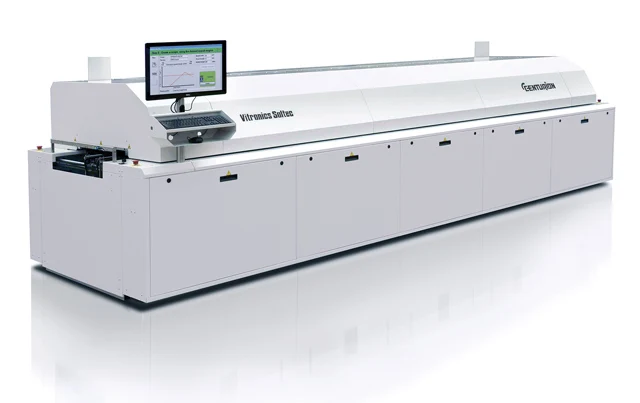Email format error
Email cannot be empty
Email already exists
6-20 characters(letters plus numbers only)
The password is inconsistent
Email format error
Email cannot be empty
Email does not exist
6-20 characters(letters plus numbers only)
The password is inconsistent


In the world of electronics manufacturing, the quality and reliability of printed circuit board (PCB) assemblies are paramount. One technology that has revolutionized the PCB assembly process is the reflow oven. These advanced machines play a crucial role in achieving precise and reliable soldering, ensuring the integrity of electronic components. In this blog, we will provide an essential guide to reflow ovens, exploring their functionality, benefits, and how they have transformed PCB assembly.
Understanding Reflow Ovens:
Reflow ovens are specialized machines used in the surface mount technology (SMT) assembly process. They utilize controlled heat to melt solder paste, creating strong and reliable solder joints between components and PCBs. Reflow ovens consist of various heating zones, conveyor systems, and precise temperature controls to achieve optimal soldering conditions.
The Reflow Process:
The reflow process involves several key stages, including preheating, soaking, and cooling. During preheating, the oven gradually raises the temperature to remove moisture and prepare the PCB for soldering. The soaking stage ensures that the entire assembly reaches a uniform temperature, allowing the solder paste to melt and form reliable connections. Finally, the cooling stage solidifies the solder joints, ensuring their stability and durability.
Benefits of Reflow Ovens:
Reflow ovens offer numerous benefits that have revolutionized PCB assembly:
a. Consistency and Precision: Reflow ovens provide precise temperature control, ensuring consistent soldering results across multiple PCBs. This consistency eliminates variations caused by manual soldering, resulting in higher quality and reliability.
b. Lead-Free Soldering: With the increasing demand for environmentally friendly electronics, reflow ovens enable the use of lead-free solder paste. These ovens can achieve the higher temperatures required for lead-free soldering, ensuring compliance with regulations and industry standards.
c. Time and Cost Efficiency: Reflow ovens significantly reduce assembly time compared to manual soldering methods. The automated process allows for simultaneous soldering of multiple components, increasing production throughput and reducing labor costs.
d. Process Control and Monitoring: Modern reflow ovens offer advanced features such as thermal profiling and real-time monitoring. These capabilities allow manufacturers to optimize soldering parameters, identify process deviations, and ensure consistent quality control.
Types of Reflow Ovens:
There are various types of reflow ovens available, including convection, vapor phase, and infrared (IR) ovens. Each type has its advantages and is suitable for different applications. Manufacturers must consider factors such as component types, production volume, and budget when selecting the appropriate reflow oven for their specific needs.
Best Practices for Reflow Oven Usage:
To maximize the benefits of reflow ovens, manufacturers should follow best practices, including proper thermal profiling, regular maintenance, and calibration. Understanding the specific requirements of solder paste, components, and PCBs is crucial for achieving optimal soldering results.
Conclusion:
Reflow ovens have revolutionized the PCB assembly process, offering consistent, precise, and reliable soldering. Their ability to handle lead-free soldering, improve time and cost efficiency, and provide advanced process control has transformed the electronics manufacturing industry. By understanding the essential aspects of reflow ovens and implementing best practices, manufacturers can achieve higher quality, increased productivity, and improved customer satisfaction in their PCB assembly processes.